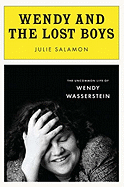
Once upon a time a playwright could dine out every night in Manolo Blahniks and buy herself a three-bedroom co-op on Central Park West--if that playwright was Wendy Wasserstein. In Wendy and the Lost Boys, veteran journalist Julie Salamon documents the emotional formation and bright-lights career of the first woman playwright to win the Pulitzer Prize and an unshared Tony Award (for The Heidi Chronicles).
Wasserstein, a gifted quipster, wrote funny-serious plays and essays that captured the angst of female baby-boomers struggling to integrate professional ambition with romance and reproduction. Wasserstein's autobiographical themes were so relatable and her physical aspect was so unintimidating that people presumed instant sisterhood, but the real Wendy was elusive. She maintained relationships with scads of "best friends," a clutch of high-profile relatives, a smattering of hapless suitors and a stable of theater world colleague-confidants, many of them gay, some of whom she referred to as her "husbands." Salamon, a reporter and author of Hospital, reveals how carefully Wasserstein stage-managed her public life by doling out selective versions of her persona, while freely pillaging the confidences of her intimates for material. Her biggest secret--the lymphoma that ended her life at 55--remained hidden until the last moment.
The biography is a bit over-detailed on Wasserstein's early career, but the arc of her life is fascinating, starting with her mother, the scene-stealing, implacable Lola, who set an example of secretiveness and claimed that she would have been just as happy if her prize-winning daughter had married a lawyer. The role of traditional husband proved uncastable for Wasserstein, but her triumphant career, her intense relationships and the achievement of single motherhood at the age of 48 fulfilled her own requirements for a remarkable life. --Holloway McCandless, blogger at Litagogo: A Guide to Free Literary Podcasts

